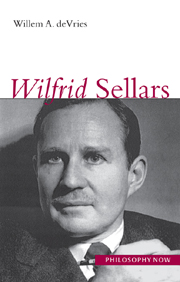Book contents
- Frontmatter
- Contents
- Preface
- Abbreviations
- 1 Sellars's philosophical enterprise
- 2 Sellars's philosophy of language
- 3 Categories, the a priori, and transcendental philosophy
- 4 Sellars's nominalism
- 5 Knowledge and the given
- 6 Science and reality
- 7 Intentionality and the mental
- 8 Sensory consciousness
- 9 Practical reason
- 10 The necessity of the normative
- Notes
- Bibliography
- Index
1 - Sellars's philosophical enterprise
- Frontmatter
- Contents
- Preface
- Abbreviations
- 1 Sellars's philosophical enterprise
- 2 Sellars's philosophy of language
- 3 Categories, the a priori, and transcendental philosophy
- 4 Sellars's nominalism
- 5 Knowledge and the given
- 6 Science and reality
- 7 Intentionality and the mental
- 8 Sensory consciousness
- 9 Practical reason
- 10 The necessity of the normative
- Notes
- Bibliography
- Index
Summary
The aim of philosophy, abstractly formulated, is to understand how things in the broadest possible sense of the term hang together in the broadest possible sense of the term.
(PSIM in SPR: 1)Twentieth-century analytic philosophy is distinctive, in part, because it treated philosophy as piecework. Philosophy, it was thought, consists of puzzles, each of which could be attacked on its own and solved or dissolved, usually either by paying attention to the way language is used or by constructing a formalism that clarifies an ideal of language. Some very valuable philosophical work was accomplished in this way, but it leaves many hungering for a broader view: a philosophy that attempts to see the world as a whole and understand how it all hangs together.
Wilfrid Sellars, almost alone, was both analytic and systematic. He utilized the full panoply of analytic tools and methods, including careful attention to ordinary language and the sophisticated deployment of formalisms, but he did so in the service of a unified vision of the world and our place in it. Because of its systematicity, Sellars's philosophy is both more difficult to grasp initially and more rewarding in the long run than that of any other analytic philosopher.
Sellars exercised a profound influence on American philosophy in the latter half of the twentieth century. Some of his influence was institutional: Sellars was an important figure in several of the leading philosophy departments in the US (Universities of Minnesota and Pittsburgh, and Yale University); he co-founded, along with his colleague, Herbert Feigl, the first American journal expressly devoted to analytic philosophy, the well-regarded Philosophical Studies; and he co-edited several anthologies that were, in their day, canonical.
- Type
- Chapter
- Information
- Wilfrid Sellars , pp. 1 - 22Publisher: Acumen PublishingPrint publication year: 2005



